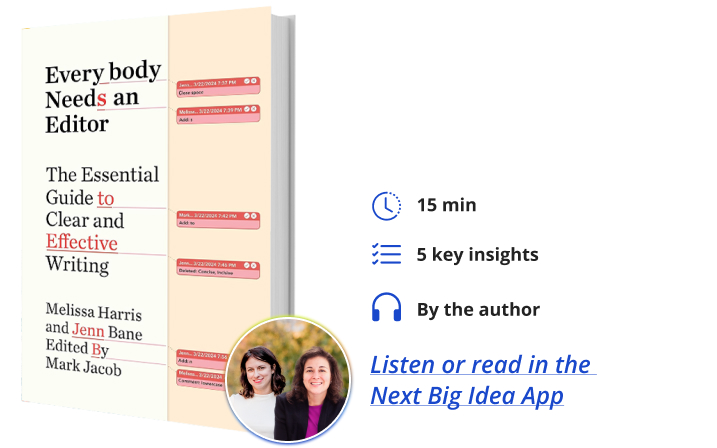Melissa Harris is the founder and CEO of M. Harris & Co., a marketing agency. She spent 15 years as a journalist at the Orlando Sentinel, The Baltimore Sun, and Chicago Tribune. She serves as an entrepreneur in residence at the Polsky Center for Entrepreneurship and Innovation at the University of Chicago and on the governing board of the Bulletin of the Atomic Scientists.
Jenn Bane is an author, producer, and the creative director of M. Harris & Co. Her first book, Friendshipping, is a feel-good guide to making friends as an adult. Previously, she worked at Cards Against Humanity where she earned a Clio Award for Excellence in Advertising.
Below, co-authors Melissa and Jenn share five key insights from their new book, Everybody Needs an Editor: The Essential Guide to Clear and Effective Writing. Listen to the audio version—read by Jenn—in the Next Big Idea App.

1. Have an elevator pitch ready.
An elevator pitch is a short story about yourself. Everyone can benefit from having one ready. An elevator pitch allows you to make swift and confident introductions (in person or in writing). It can also act as a foundation for interviews, cover letters, or sales calls.
Your pitch should be brief enough to deliver while riding between floors on an elevator. (Notice we didn’t say delivered to someone trapped with you on an elevator. This isn’t an aggressive, hard sell.)
To get comfortable saying your pitch out loud, start by writing it. Here’s how:
- Summarize yourself in one intriguing sentence. Lead with your highest-level self-description, like that you’re a former accountant now teaching math to unruly kids, or a retired naval officer who suffered bad seasickness.
- Nail the grippy details. A successful elevator pitch invites— demands—a follow-up question. You just said you’re a project manager who’s worked in every country that starts with the letter N. Now we have to know: Which did you like better, New Zealand or Nepal?
- Do more than spout your résumé. As in storytelling, your pitch should have a narrative flow. Use an anecdote to sum up your experience or tell your tale in chronological order. For example: After a lifetime of investigative journalism, you’re about to publish your first detective novel.
- Practice it out loud. Use a timer. Get it as close to thirty seconds as possible.
- Be mindful about name-dropping. Mentioning specific people or places boosts credibility, but if you immediately list five celebrity pals, you won’t come across as successful. You will come across as a blowhard.
2. Not everything belongs in an email.
The second you hit send on an email, you lose control of your audience. You don’t get to decide who sees it next. Don’t write anything you wouldn’t want to see screenshot and then posted on social media, or forwarded to your mom, or to a journalist. Emails feel fleeting but are forever. So don’t bad-mouth your boss in writing.
Don’t ask for a raise in an email, either. Instead, ask for a meeting. Yes, you should state that the purpose of said meeting is to discuss a possible raise but save the negotiations for face-to-face. If you think it’s easier to make your case in writing, consider that it’s also easier for your boss to say no in writing.
“It’s better to send someone one email with three short topics than three separate emails.”
Don’t write a long series of paragraphs. You know how people sometimes say that a meeting could have been an email? Well, the opposite is also true. People don’t read long emails, so don’t write them.
Consolidate your emails whenever possible. It’s better to send someone one email with three short topics than three separate emails. But if you do that, number the topics so your recipient won’t overlook one of them.
And don’t reply all with large groups—unless you’ve got the absolute funniest one-liner of all time.
3. Bad news should be delivered in person.
When you’re delivering really bad news, you really should do it in person, not in writing. But since we wrote a book about writing, let’s take an example where an email might be appropriate. Say your company is closing a branch office, a move that suggests sales are down and some jobs might be in peril. You have to write a memo to the staff:
- Don’t make your email a guessing game. Deliver the bad news clearly and directly in the first two sentences. Don’t explain to your audience why this news is not so bad, don’t give misleading explanations, and don’t make promises you can’t keep. You’ll be accused of being a liar later.
- Acknowledge their concerns. Stay positive but stay honest. Keep it vanilla. Don’t be clever. Avoid adjectives and adverbs that might be seized upon by people who are upset.
- Don’t get personal and say something like, “As a ten-year veteran of the company, I feel especially bad about this.” No one cares.
Now, here’s an example of a direct, compassionate email:
Staff—
We have some bad news: We’ll be closing the Centerville office as of June 30 because of lagging sales. Our colleagues who work there will be transferred to our main office, so please make them feel welcome.
I’d like to assure you that no staff reductions are anticipated at this time, and I’ll point to the fact that we’re launching a new product next month as a sign that we’re upbeat about the future.
If you have any suggestions, questions, or concerns, please contact me to discuss them.
4. Be kind and direct in your feedback.
Let’s say you’re giving feedback on a colleague’s writing. You should tell the truth, but it shouldn’t be the unvarnished truth. Use a little varnish. Like so:
I took a look at the “About Us” you drafted for the website. I love the way you describe our company’s mission. That’s a message we have to get across better to both our customers and our own staff. I wouldn’t change a thing about that sentence. It’s perfect.
Beyond that, you can do some more trimming. Let’s try to get this down to two paragraphs.
Also, have you thought about saying something about us being named “Best Software Company” by that industry group? It was a huge honor, and you know how potential customers love that kind of validation.
Great job.
Keep negative comments brief, and don’t be too picky. If you’re asked for your opinion on a piece of text that will be released publicly, try to find out whether another editor will read it before it’s released. If so, you don’t have to get into the weeds about every little thing.
“Give them a chance to get it right and retain the pride of authorship.”
Give the person a chance to fix their own problems. For example, if it’s a first draft, suggest what they might add or delete. Don’t rewrite the whole thing right away. Give them a chance to get it right and retain the pride of authorship.
5. Leave people alone.
When they’re on vacation, that is. Honor people’s vacations, and don’t contact them. If you work closely on a team with someone who’s going on vacation, you may want to do a little prep work first. You can ask:
- Is there anything brewing that could become a crisis while you’re away?
- Do you want me to let you know if that happens?
- Is there anything else important you would want to know about—that I should interrupt your vacation to tell you?
- How should I contact you? Should I text, call, or email?
About email: You may be tempted to keep cc’ing your colleague on daily emails and including them in responses. Don’t assume that. It’s better to ask what they prefer rather than trying to read their mind.
You could offer to schedule emails for the day they return or to write one update email at the end of the week instead of forwarding twenty.
And if you are the one trying to get away, be proactive to protect yourself:
- Resist reading work emails on vacation. It’s the same as working—and you, my friend, are on vacation.
- Before you go, let important clients or close colleagues know so they can get last-minute questions out of the way.
- Ask a trusted colleague to contact you if something happens that you should know about. Yes, that’s vague. And it requires a colleague to exercise good judgment on whether to bug you. So, choose wisely.
- Set an out-of-office notification on your work email and ask a colleague if they would be willing to be an emergency contact.
An example:
I am out of the office this week and will have limited access to email. I will return March 9. If your issue is an emergency and requires urgent attention, please contact my colleague Pat Rogers at [Pat’s email address].
What you shouldn’t do is write your memo like this, even if you want to:
I am out of the office until further notice.
If your issue is an emergency and requires urgent attention, deal with it yourself.
The goal is to make the recipient feel like a collaborator. You’re working together to get it right.
To listen to the audio version read by co-author Jenn Bane, download the Next Big Idea App today:































